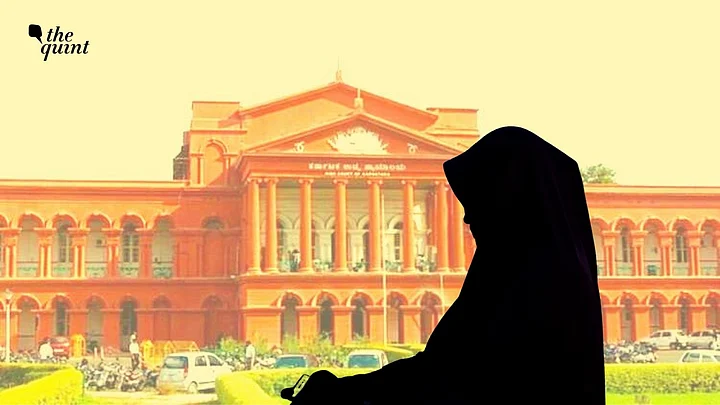The Karnataka High Court on Monday, 15 February, resumed hearing the petitions filed before the court by Muslim girl students seeking protection of their right to wear hijab to classes.
The matter is being heard by a three-judge bench of Chief Justice Ritu Raj Awasthi, Justice Krishna S Dixit, and Justice JM Khazi.
Continuing his arguments for the petitioners, Senior Advocate Devadatt Kamat pointed out that “the essence of Article 25 (of the Constitution) is that it protects the practice of faith but not a mere display of religious identity or jingoism".
“The framers of the Constitution used the term freedom of conscience. What it protects is an innocent practice of faith, but not a display of religious jingoism...The essence of Article 25 is that it protects a practice of faith, but not a display of religious jingoism."Senior Advocate Devadatt Kamat
He also referred to past judgments, including one by Supreme Court Judge DY Chandrachud, as well as those by foreign courts, to establish that the State needs to create a positive environment facilitating enjoyment of rights.
Further, he dealt with the use of the term "savrajanik suvyavasthe" in the Government Order, which he said that the Kannada translation of the Constitution uses for “public order”. This came after Kamat had argued on Monday that “public order” cannot be left on an MLA panel to decide, and a question had arisen about whether or not the government order had used the term to back their decision.
On What the Law Says About Essential Religious Practice
Article 25(2) of the Constitution of India states that nothing in this article shall affect the operation of any existing law or prevent the State from making any law that regulates or restricts any economic, financial, political or other secular activity which may be associated with religious practice; or provides for social welfare or reform.
Stating that on Monday he was asked by the court whether ‘reform’ in Article 25(2) can apply to essential religious practice, Kamat cited the Sardar Syedna Taher case in which the top court had struck down a Bombay law which banned ex-communication from a community on petitions by Bohra members and said: if it is an essential practice, it must be upheld.
Kamat also cited the apex court as having said that social welfare and reform laws are not intended to enable the legislature to reform a religion out of its existence or identity.
Further stating that the judgment allows the State to regulate “deleterious practices,” Kamat reiterated that wearing hijab is an innocuous practice.
‘Heckler’s Veto’ Cannot Be Allowed: Senior Advocate Kamat
Kamat, during the course of his submissions, went on to cite a judgment by Supreme Court Justice DY Chandrachud in the "Bhobishyoter Bhoot” case, in which the apex court judge had said that there is growing intolerance in the country.
Also stating that if he is on the street and somebody stops saying he does not like Devdatt Kamat, the State cannot stop him from going to the street on the grounds that it will create public order issue. Thus, the heckler’s veto cannot come in the way of fundamental rights, he argued.
Quoting from a South African judgment he had said: ”The possibility for abuse should not affect the rights of those who hold sincere beliefs.”
“Our secularism is a positive secularism, we recognise all religions as true,” Kamat further added, arguing that India’s secularism is different from Tukey’s.
In reference to the Karnataka High Court’s interim order, Kamat said:
“This order in effect suspends fundamental rights. Kindly do not continue this interim order.”
He also urged the court to make some leeway, and in wait of their final decision, permit those who want to wear the head scarf to do so in addition to the uniform.
‘We Are Not Violating Any Public Order, Equality or Unity’
Following Kamat’s submissions, Sr Adv Professor Ravivarma Kumar, appeared for a girl called Resham who was prevented from entering her school as early as on 28 December, and pointed out that even the government has said it is yet to take a final call on the uniform.
Pointing out that government order says clothes which do not threaten public order, equality or unity must be worn, Kumar said:
“We (the muslim girls wearing hijab in Karnataka institutions) are not violating any public order, equality or unity.”
Background
Meanwhile, a counsel representing the petitioners in the case, has urged the Karnataka High Court to adjourn the hearing till 28 February, reported NDTV.
Advocate Mohammad Tahir, counsel for Ayesha Almas and four other students from Udupi government junior college for women, cited the ongoing Assembly polls in five states, and said that political parties are exploiting the hijab row for electoral goals.
Thereby, warning that "any mischievous act of any person will further stoke communal division,” the plea has sought adjournment of hearing till February end.
Senior advocate Devadatt Kamat, representing a group of Muslim girls, made extensive arguments on Monday, explaining why the Karnataka government order on prohibition of clothing is invalid. He also argued that the state cannot hide behind potential law and order problems to stop the girls from exercising their fundamental rights.
On 10 February, the Karnataka High Court had agreed to continue hearing the pleas filed by the girls, but had refused to pass an interim order that would have allowed them to continue wearing hijabs until the court arrives at a final decision.
While directing the reopening of colleges in the state, the judges had also controversially ordered that no student should wear any religious clothing while the court continues to hear the case.
"Pending consideration of all these petitions, we restrain all the students regardless of their religion or faith from wearing saffron shawls (Bhagwa), scarfs, hijab, religious flags or the like within the classroom, until further orders."Karnataka High Court
